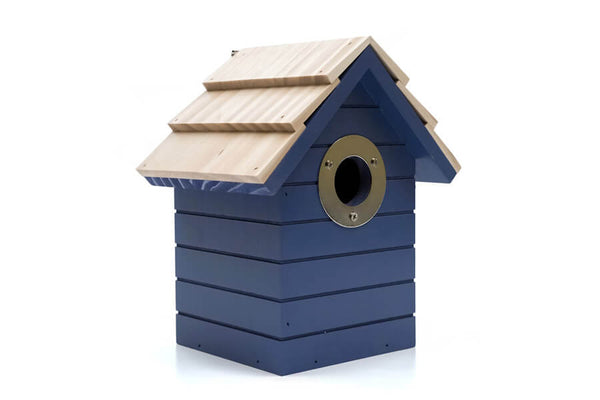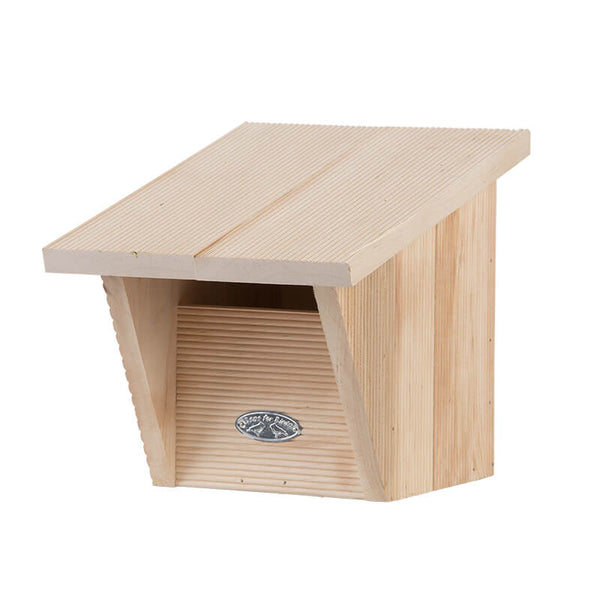When to Clean Out Bird Nest Boxes
Understanding when to clean out bird nest boxes can be a little tricky, but that's why we're diving headlong into it today. Making sure that each nest box in your garden is as comfortable and friendly as possible is the best way to ensure you get repeat visitors. Pairing that mentality with bird feeders will ensure a lively garden packed with birds.
If you're looking at introducing a bird box to your garden but are on a small budget, don't forget to check out our guide on how to build a bird box.

How to clean out bird nest boxes?
When dealing with a nesting box, there are a few things that you really ought to bear in mind. The first thing is the presence of chemical cleaners. By that, we mean that you really shouldn't use them.
Wood is a very porous material, meaning that it can soak up chemicals, and slowly leach them into the nesting material that your next tenants use. Avoid this by steering well clear of chemical cleaning products.
You should also avoid the use of flea powders or similar powder cleaners in a bird box, as their scent can deter birds from a nesting box. To be sure that a bird box is as inviting as possible, use only boiling water in the cleaning process.
A great first step is simply to empty out everything that's within the next box. At the end of a breeding season, once all birds are gone, any nesting materials and unhatched eggs should be totally removed.

The old nest should be removed to eliminate any amount of scent that the previous owners may have left in there - that will allow new birds to see it as a more friendly environment.
Use a scraper or something similar to remove the whole content of the nest box. From unhatched eggs to droppings and even wood shavings that might have clumped in poor weather, it all needs to go.

Once you've removed the contents of the nest box, wash out the inside. Do this with boiling water straight from the kettle. This will eliminate any of the remaining parasites from within the wood, as well as any unhatched eggs from parasites, too.
Once the box has been cleared, you've cleared the way for a bird family to create a new nest in their own time. The old nest should be disposed of in your bin, instead of in the garden.

Can you clean a nest box?
You can, but you absolutely cannot clean a nest box when there are birds within it. The reason for this is that most birds are protected under the law, meaning that you can't disturb them, or anywhere that they spend a lot of time.
Bird boxes can get messy, though. If you spend a lot of time in your garden, you might notice that the next box gets messy and, potentially, smelly.

Therefore, it's only understandable that you would want to clean bird boxes in your garden.
So, to sum things up in a slightly more concise sense, yes - you can clean a nest box. However, you cannot clean a nest box when there are birds in residence. It is a crime to disturb birds, even if they're on your land.

Should I clean a bird box after fledging?
Yes, we would absolutely say so. The reason for this is that over the time that a nest box is used, the wood will absorb scents and excretions from the birds themselves.
This is ideal for the residents of the old nest, as it allows them to make their own nest smell like home.
This isn't ideal for new birds, however.
To make it more hospitable for new birds coming into your nest boxes, remove all the old nesting material, and then wash the wood down with boiling water.
Boiling water will kill any parasites or viruses within the nest, allowing you to have clean bird boxes ideal for introducing more of a bird population to your home.

What happens if you don't clean out a birdhouse?
To cut a long story short: it's bad.
The reason for this is that nest boxes contain the birds nest, which will have been made by one of the parents shortly before the nesting season began.
This is a part of the ritual the birds somewhat follow at the start of every breeding season - a new bird will want to bring in their own nesting materials, creating a bird box that it can enjoy.
For this reason alone, bird nest boxes should be cleared and cleaned. However, it's also important from a safety point of view.

For instance, while a bird box is an active nest, birds may defecate in the box. In their feces may be a level of parasites or viruses that can survive independently of the birds themselves.
Therefore, when new birds come to the nest, such as blue and great tits, they can pick up on these parasites, and become sick. Blue tit nest boxes are generally much smaller!
In good situations, this can lead to nest desertion. In bad situations, though, you might end up with a bird box full of sick and dying birds.
Obviously, we would all like to avoid sick birds, so make sure that you remove any nest materials from a bird box and clear it out.

Should you remove old nests from bird boxes?
Yes, you should remove an old bird's nest from a bird box. The reason for this is that as part of the ritual that birds follow at every mating season, one member of the birds pairing will want to build a nest.
Whether male or female, this bird will typically build a nest, and then show it to their counterpart to impress them into a courtship.

Therefore, if small birds cannot build a nest in your bird box, they will not be able to sustain this ritual. Furthermore, these small birds wouldn't be able to create a bond, leading to the numbers of those birds potentially declining.
Therefore, we would say it's totally essential to remove any old bird nest from a bird box. This removal process might be a little frustrating but, just like bird feed, it's a small part of creating an overall inviting area for birds to visit and live.
It's also worth carrying out any repairs that your bird box might need, too. For example, if you notice that the entrance hole was too small for a bird to get materials for a bird nest into the bird box, then you might consider drilling a slightly larger hole.
We hope that this article has given you some insight into when to clean out bird nest boxes in your garden. It's not a complex process, but it's a vital one!











